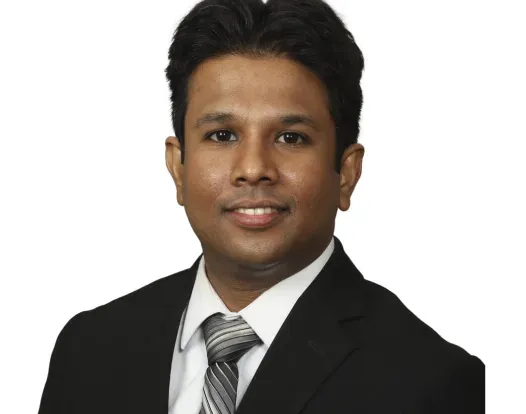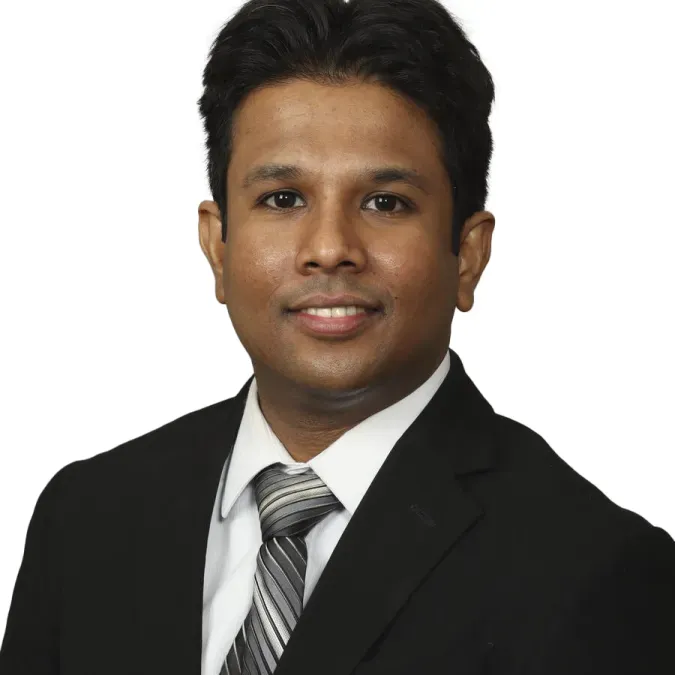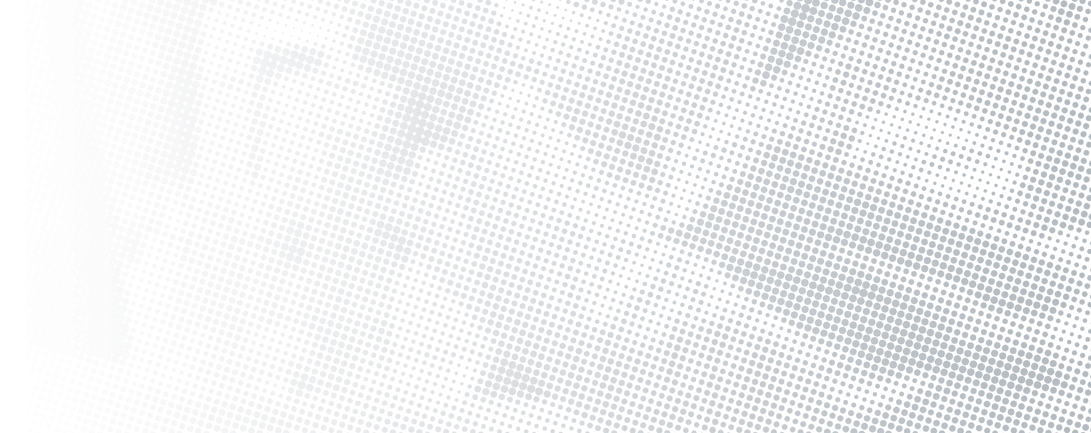These researchers have dedicated their careers to finding new treatments and cures for people with cancer.


The breakthrough discovery made a significant difference in Anya's course of care — and could potentially improve the lives of many future patients.

One of the most challenging parts of hematologist/oncologist Dr. Jithma Abeykoon's job is the moment when he realizes that, despite all his best efforts, he's run out of treatment options for his patient.
"That is one of the worst things I experience. I feel terrible when I have to say I have no more options to offer, no clinical trials left,” Dr. Abeykoon says. “The only thing I can do is offer supportive care and help the patient have the best quality of life with dignity before they pass away. But that is what brings me to work every day: To find ways to help these patients.”
He thought he'd reached such a point when treating Anya Magnuson, a young woman and aspiring photographer diagnosed with a rare blood cancer called Erdheim-Chester disease (ECD). But when Dr. Abeykoon and his research team uncovered a rare mutation in Anya's cancer, the discovery changed the entire course of her treatment — and potentially the outlook for countless patients in the future.
“The knowledge we acquire by studying rare diseases can be disseminated to successfully study other cancers. I believe it is very important to fund research focused on rare diseases. These studies not only help our own patients, but the entire scientific field,” says Dr. Abeykoon. “When we first found that there is a variant of unknown significance in the genetic analysis of Anya’s tumor, we questioned right away if we can exploit this for therapeutic benefit. Then we worked as a team.”
Building a Foundation for Better Care
Supported by a Conquer Cancer grant, Dr. Abeykoon launched an initial research project to map the genetic signs of non-Hodgkin lymphoma (NHL) and craft new models of treatment for patients with rare blood cancers. Grant funding allowed Dr. Abeykoon to secure protected research time, access cutting-edge facilities, build a multidisciplinary team, and refine the skills needed to bring potential breakthrough findings from lab to clinic. Dr. Abeykoon used genomic sequencing techniques to better understand the drivers of genetic mutations that cause NHL. This knowledge helped Dr. Abeykoon and his colleagues develop a clearer picture of how to target Anya’s ECD and give her a second chance at life.
“Through my initial Conquer Cancer grant-supported research, I was able to discover a new treatment strategy with a novel mechanism of action for patients with NHL,” says Dr. Abeykoon. “The research done with Conquer Cancer funding enabled me to learn basic science techniques and acquire unique skills in translational research. This knowledge helped me to recognize unique mutations in the cancer Anya has, Erdheim-Chester disease, and formulate an effective and novel treatment strategy for her.”
This initial research built the foundation for Dr. Abeykoon and colleagues to uncover the genetic culprit in Anya’s case: CSF1R. When mutated, this gene can make a protein that causes cancer to fatally spread. Dr. Abeykoon and team quickly adapted a promising drug, pexidartinib, to target CSF1R and tailor Anya’s course of care. This was the first successful usage of pexidartinib to treat blood cancer. The breakthrough treatment strategy — made possible by donor-funded research — brought Anya from a death sentence to rebuilding her life and planning for a future.
“We were the first to prove that targeting CSF1R alterations in blood cancers like histiocytic neoplasms is indeed effective,” Dr. Abeykoon says. “I believe this is a major advancement in the field.”
The Impact of Colleague Collaboration
Teamwork was essential to unraveling the big picture of Anya’s genetic alteration and bringing a breakthrough treatment into the forefront of possibilities. Dr. Abeykoon and his colleagues — united through Conquer Cancer-funded research — each played a vital and unique role in piecing Anya’s diagnosis and treatment together:
- Dr. Terra Lasho mapped the CSF1R gene and assessed if it was targetable;
- Dr. Karen Rech confirmed the pathological diagnosis of ECD;
- Dr. Wasantha Ranathunga worked to predict the mutated protein’s structure;
- Dr. Surendra Dasari analyzed the genetic changes in Anya’s tumor;
- Dr. Xiaosheng Wu helped determine whether the mutation could be targeted;
- Dr. Ronald Go, Dr. Thomas Witzig, and Dr. Abeykoon conducted additional work in Dr. Witzig’s laboratory at Mayo Clinic, MN, and introduced the resulting treatment to patients
“The Conquer Cancer research grant enabled me to formulate a great team of scientists, mentors, and clinicians,” Dr. Abeykoon says. “Because of this team, we can now ask a question in the clinic, bring the question to the lab to find answers, and go back to the clinic to serve the patient with the answers.”
When Dr. Abeykoon was a medical resident, he was fascinated by a lecture from Dr. Terra Lasho, an assistant professor of medicine at Mayo Clinic, who spoke about genetic variants of undetermined significance (VUS). While these changes remain poorly understood, VUS can sometimes hold the key to helping doctors manage rare cancers and personalize their patients’ treatment.
The goal of her talk, Dr. Lasho explains, was to highlight the importance and relevance of VUS. Dr. Abeykoon, she continues, took enthusiastic initiative and reached out subsequently to discuss specific cases involving VUS — including Anya’s.
“It is astonishing to see the direct results that collaboration has on the advancement of patient care,” Dr. Lasho says. “Dr. Abeykoon’s remarkable passion for his patients, enthusiasm for the science, drive to reach out for guidance, and tenacity to follow through, have not only opened key translational collaborations but directly resulted in life-saving patient care.”
Anya’s case, she says, is an amazing example.
Ongoing Trials, Breakthrough Treatments
To help ensure more patients can conquer cancers that currently lack a cure, Dr. Abeykoon is expanding his research. He recently co-launched a phase I clinical trial to assess the effectiveness of a promising treatment approach for patients whose blood cancers are recurrent or resistant. He’s also helping lead another study to evaluate an emerging drug that can target the same genetic mutation linked to Anya’s ECD.
“As a result of my findings, an investigator-initiated clinical trial is now open at the Mayo Clinic for patients with NHL and histiocytic cancers,” Dr. Abeykoon says. “Further, as a result of Anya’s success story, we are opening a separate clinical trial to test a drug that targets CSF1R, the same protein that was altered in the cancer that Anya has.”
Meanwhile — just over three years since that treatment took hold — Anya barely thinks about her cancer. She works and exercises. She lives independently and volunteers at a local food pantry. She still takes medication to manage her cancer, and she’ll probably always have to. But it no longer dominates her life or dictates her future. Meanwhile, Dr. Abeykoon works to accelerate more breakthroughs in blood cancer research so patients like Anya can make new memories and live full lives.
“Conquer Cancer funding permitted me not only to discover new treatments for patients with lymphoma but also to build a phenomenal team of scientists who have helped many patients like Anya,” says Dr. Abeykoon. “Due to this body of work done as a team, we are now able to bring new treatment strategies and new hope for our patients with rare cancers.”



